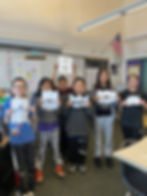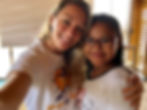When you buy a Kikori Individual Educator Membership, we will gift one Pro Membership as part of our Social Mission. Learn More.
ONE PURCHASED = ONE GIFTED
Favorite Teacher Resources
At Riverside Elementary in Jackson, MN, a powerful transformation is underway. Led by Principal Kim Meyer and a dedicated team, the school is becoming a place where every child feels seen, heard, and supported. Learn how Kikori was used to strengthen PBIS.
At Parkview Elementary, social-emotional learning and behavior expectations aren’t separate - they work hand-in-hand to create a school-wide culture where students thrive academically, socially, and emotionally.
Through a district-wide partnership with Kikori, LYSD has brought social-emotional learning (SEL) to life in a way that honors Yupik traditions, uplifts student voices, and fosters resilience. This is the story of how a rural district turned SEL into a pathway for healing, growth, and community revival.
At Griffin Memorial, “students thrive when they feel connected, supported, and known”. With a commitment to the Responsive Classroom approach, Griffin educators set out to create classrooms where students don’t just learn academic skills, but also build empathy, resilience, and community.
Case Studies

Empower educators, inspire students and transform classrooms.
Kikori’s digital curriculum offerings are designed to build stronger classroom communities, promote student well-being, and foster a deep sense of belonging - all through easy-to-use, research-backed activities that support academic and personal growth.
Fave Educator Resources
Whether you're new to Kikori or looking to freshen up your routine, these teacher-loved resources are ready when you are.

Create Community Every Day with Kikori Pro!
✅ Full access to our ever-growing library of SEL-aligned, community-building activities
✅ A complete Morning Meeting and Advisory Curriculum
✅ Brain breaks & mindfulness activities to keep students engaged and centered
✅ Done-for-you slides that teachers (and students!) are obsessed with💥 Ready to level up your classroom experience?
.png)

Create Classrooms Where Students Feel Connected, Empowered, and Ready to Learn
Wellness, Resilience, Belonging
Daily Morning Meeting and Advisory Activities to Transform Your Classroom
The calendar makes it easy to bring connection, growth, and wellness into the classroom—every single day. With a consistent structure and creative variety, students thrive in routines that feel engaging, supportive, and fun. Every activity aligns with CASEL’s core competencies, helping students develop critical life skills for both school and life.

Morning Message or Advisory Announcement
Start with intention and inspiration
.png)
Sharing or Acknowledging Activity
Celebrate student voices and strengthen belonging

Morning
Greeting Activity
Practice social skills through friendly, inclusive greetings.
.png)
Weekly
Learning Intention
Learn through intentionality with a weekly intention based on CASEL standards.

Weekly
Check- In
See how emotions change throughout the week with a
fun and relevant weekly check-in.

Weekly Energizer/
Brain Break
Take a brain break and get the energy going with a fun
weekly energizer activity.

Weekly
Calmer/ Mindfulness
Calm down and practice mindfulness with a weekly calmer.

Weekly Experiential Tier 1, 2, and 3 Activity
Experiential Tier 1, 2, and 3 activities to use in whole group settings, small groups, or 1 on 1.

Weekly Call &
Response
Bond, laugh, and keep focus on with a fun weekly call & response.

Closing Circle
End the day with gratitude, reflection, and intention with our closing circle activities.

Bringing the World into Your Classroom
Every day is an opportunity for discovery with Kikori’s National Day activities! These creative prompts help students explore the world around them through connections to history, STEM, nature, storytelling, and cultural moments—bringing fun, relevance, and curiosity to the classroom.
Kikori's Community Building Model
Our curriculum is built on a research-based Community Building Model inspired by the stages of group development: Forming, Storming, Norming, and Performing. Through this framework, educators guide students to build safe, connected spaces, practice collaboration and empathy, and grow into reflective, responsible leaders. This model lays the foundation for resilient classrooms where whole-child development is prioritized and community flourishes.

In this first stage, students are getting to know one another and learning how the group works. There's excitement and curiosity, but also a need for structure, safety, and clear expectations.
Forming

As comfort increases, differences in opinions, personalities, and behavior may surface. This stage involves navigating conflict, building emotional awareness, and developing trust through guided support.
Storming

The group begins to find its rhythm—students understand expectations, collaborate more easily, and start to feel a stronger sense of community and shared purpose.
Norming

Students work together confidently, support each other’s growth, and show leadership. The group functions with trust, cooperation, and a collective commitment to thriving together.
Performing
The Play-Reflect-Connect-Grow Process
Based on Kolb’s Experiential Learning Cycle, every Kikori activity follows a proven path:
Engaging in real-world, active experiences
Thinking deeply about what was learned and felt
Relating insights to personal and group experiences
Applying learning to future situations and challenges

“If you’re looking for something to build students’ self-regulation, social skills, and emotional understanding - Kikori brings it all together. Whether or not you’re a PBIS school, it’s a powerful way to build community.”

KIM MEYER
Riverside Elementary, Principal

“One of my quietest students became our morning meeting leader. He greets every classmate with a fist bump and a smile. I’ve never seen him like that before.”

Minard Abenojar
Marshall School, Teacher
.jpeg)
“I’ve seen students come in late just to make it to morning meeting. They don’t want to miss it.”

Roxane Manguera
Lower Yukon SD, Alaska

“Even on busy days, I can run meaningful meetings without stress, and kids get excited for Kikori every morning.”














%20April%2022%20Earth%20Day%20(duplicate).png)
%20April%2017%20National%20Haiku%20Day.png)
%20Nov%2013%20World%20Kindness%20Day%20(1).png)

%20Feb%2011%20National%20Make%20a%20Friend%20Day.png)

%20Dec%2013%20National%20Ice%20Cream%20Day%20(1).png)
%20April%207%20World%20Health%20Day.png)
%20April%2014%20Gardening%20Day.png)


%20April%2029%20Day%20of%20Trees.png)
